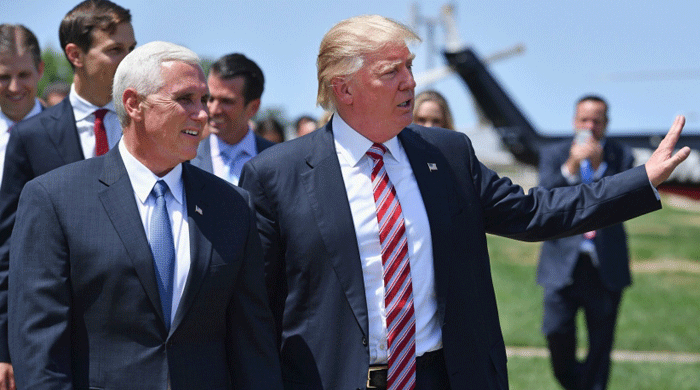Trump’s administration will bring big changes to the tech world. Here’s what you should look out for as a consumer.
It’s a new world: Donald Trump’s world. As 2017 hits, we’re going to see the U.S. government’s attitude towards a range of technologies change, whether it be about a lighter touch on regulation or a harsher look at companies that import heavily from China.
I hate making stock predictions. I’m going to try to stick to what I think you should expect and do, as U.S. tech consumers, to prepare for 2017. For each prediction, I’m also trying to provide an action you should take to put yourself in the best position for the future.
1. Sprint and T-Mobile will merge.
Sprint’s stock jumped after the election on the assumption that Sprint and T-Mobile, which want to merge, will do so. The merger has been blocked so far by Obama’s team, and it has been widely expected that a Republican FCC will let it go through. There could be an announcement as soon as January.
While Trump has come out against the Time Warner/AT&T merger, he said he’s offended by media consolidation, not broadband consolidation; a pure wireless merger may not spark his ire.
The outcome will be the end of the current wireless price wars. As we’ve seen in Canada, countries with three major players, and no requirement to share networks with third parties, tend not to have aggressive pricing. We should expect to see wireless costs in the U.S. normalize at the AT&T/Verizon levels, bringing home more profits to investors in the combined Sprint/T-Mobile.
What you should do: Lock in a really good rate plan soon, because prices may go up. Study low-cost virtual carriers like Ting, Republic Wireless and Walmart Family Mobile, which may still offer deals.
2. Verizon 5G will be the next big broadband competitor.
This prediction wraps together a few elements. Republicans have been hostile to municipal broadband, and a key Trump adviser has indicated that he’s against “set-asides” in upcoming spectrum auctions, which would prevent Verizon from snapping up most of the available airwaves. All that said, the sleepy cable monopolies, with their constant rising prices, are still ripe for disruption. Verizon’s home 5G launch in 2017 will be boosted by big wins in upcoming spectrum auctions, giving you one more strong choice for home broadband going forward, and fulfilling the promise that Fios never did.
What you should do: Look for 5G home broadband promotions as soon as the service launches in your area. Switch back and forth between 5G and cable annually to keep the best promotional rate.
3. Apple’s prices will go up. Huawei and LeEco may be dead in the water.
Trump has expressed great displeasure at Apple manufacturing in China, but the company can’t move its giant operations, so it’ll just absorb any new tariffs into its pricing structure. Think of it as an extra $50 hit on Apple products. Meanwhile, Chinese firms that don’t already have a strong operation here — think Huawei and LeEco — will find few routes in. Motorola, now part of Lenovo, may also suffer. Americans looking for lower-cost phones will be able to turn to LG, made in US ally South Korea, and Blu, a U.S. company that manufactures in China but sells its products so inexpensively that a slight price hike won’t matter so much.
What you should do: If you see an Apple product on sale, grab it. They’re not going to get cheaper.
4. Solar, Hyperloop and Tesla are on the way out.
“Green” technologies are an absolute no to Trump’s advisers, and as he promised to bring back jobs via coal mining and fracking, fossil fuels will remain cheap enough to make solar energy and electric cars non-viable. Gas prices will remain low. The self-driving car revolution will continue, and aftermarket hotspot options like the ZTE Mobley will succeed. If Tesla remains anything, it’ll be a prestige brand for the Silicon Valley cultural elite.
What you should do: Look for cars with I/O ports and upgradeability for technologies like CarPlay, Android Auto and future cloud intelligence to make your traditional gas car smarter and smarter. AI is going to start advancing faster than the traditional car replacement cycle.
5. Net neutrality will be up in the air.
Trump has come out against net neutrality as attacking conservative media. But, at the same time, Trump has expressed deep suspicion of media consolidation, which may cause him to cast a harsh eye on service providers that filter or price differently by content.
What you should do: Right now, nothing. This situation is too unformed for coherent action.
6. Twitter and Facebook will be vindicated, pyrrhically.
Twitter is struggling financially, but it’s how the President-Elect got his message out. I can see the government adopting Twitter as a semi-official way to communicate with people. That’s going to give the service a new lease on life. Meanwhile, this was the Facebook election, with memes and conspiracy theories energizing voters. But the intense negativity and harassment on these services could be emotionally toxic to anyone who doesn’t like constant conflict. In the long term, this could lead to a decline of both networks for more intimate, controlled milieus.
What you should do: If you aren’t into conflict, consider moving to more closed or targeted social networks. Snapchat and Instagram, for instance, don’t have the level of negativity commonly found on Twitter and Facebook (and Instagram has keyword blocking). You can form groups of friends and family in iMessage or Hangouts as well.



